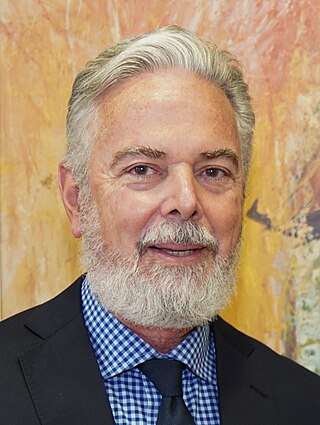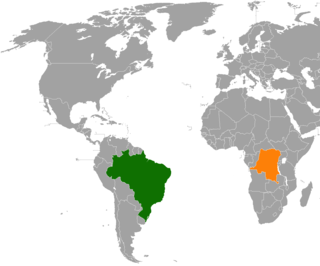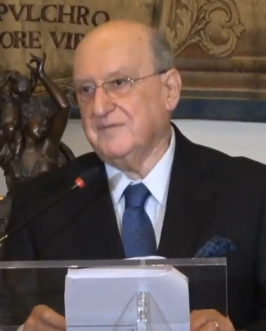
The Ministry of Foreign Affairs is responsible for managing the foreign relations of Brazil. Brazil is a significant political and economic power in Latin America and a key player on the world stage. Brazil's foreign policy reflects its role as a regional power and a potential world power and is designed to help protect the country's national interests, national security, ideological goals, and economic prosperity.

José Maria da Silva Paranhos Júnior, Baron of Rio Branco was a Brazilian noble, diplomat, geographer, historian, politician and professor, considered to be the "father of Brazilian diplomacy". He was the son of statesman José Paranhos, Viscount of Rio Branco. The Baron of Rio Branco was a member of the Brazilian Academy of Letters, occupying its 34th chair from 1898 until his death in 1912. As a representative of Brazil, he managed to peacefully resolve all Brazil's border disputes with its South American neighbours and incorporate 900 thousand square kilometers through his diplomacy alone.

The Ministry of Foreign Affairs conducts Brazil's foreign relations with other countries. It is commonly referred to in Brazilian media and diplomatic jargon as Itamaraty, after the palace which houses the ministry. Since 1 January 2023, the minister responsible is Mauro Vieira.

Río Branco is a city in the Cerro Largo department of northeastern Uruguay, it borders the Brazilian city of Jaguarão, with which it communicates through the Baron of Mauá International Bridge.
Sérgio De Souza Fontes Arruda is a Brazilian diplomat, currently the Ambassador of Brazil in Malaysia.

Antonio de Aguiar Patriota is the current Ambassador of Brazil to the United Kingdom and former Minister of Foreign Affairs. Patriota took office as foreign minister on January 1, 2011, and remained in office until August 26, 2013.

Brazil and the Democratic Republic of the Congo established diplomatic relations in 1968. Both nations are members of the Group of 24, Group of 77 and the United Nations.

Secretary General of Foreign Affairs is the highest position in Brazil's professional diplomatic career. The position must be occupied by a born Brazilian, admitted to the diplomatic career by public exams, and he or she must be a career ambassador. It is generally considered "the most graduated Brazilian diplomat" The Secretary General manages the Itamaraty, Brazil's Ministry of Foreign Affairs. He or she acts under the guidances of the Minister of Foreign Affairs of Brazil. As vice-chancellor of Brazil, the Secretary General is the Acting Foreign Minister inside Brazilian borders during all the trips abroad performed by the official, political Minister.

Nestor José Forster Júnior is a Brazilian diplomat, who formerly served as Ambassador Extraordinary and Plenipotentiary of Brazil to the United States of America in Washington, D.C.

Diplomatic relations exist between the Republic of Austria and the Federative Republic of Brazil. Both nations are members of the United Nations.

Marcos Bezerra Abbott Galvão is a Brazilian diplomat, current Ambassador to the People's Republic of China and former Ambassador to the European Union in Brussels, Belgium. From 22 February 2017 to 7 March 2017, Galvão was Acting Minister of Foreign Affairs.

Maria Nazareth Farani Azevêdo is a career diplomat. She has been the Brazilian Consul General in New York City since 2021.

Manuel Henrique de Melo e Castro de Mendonça Corte-Real is a Portuguese diplomat and historian.

Carlos Alberto Franco França is a Brazilian diplomat who served as Brazil's Minister of Foreign Affairs from 2021 to 2022. He was appointed by President Jair Bolsonaro on 29 March 2021 to replace outgoing Minister Ernesto Araújo.
Susan Kleebank is a Brazilian diplomat. From 2012 to 2017, she served as Brazil's ambassador to Slovakia. She is currently consul general of Brazil in Geneva.
Ana Cândida Perez is a retired Brazilian diplomat. She was the Consul-General in Shanghai (2012-2017) and the Brazilian ambassador in Abuja (2009-2012).
The Embassy of Peru in Brazil is the diplomatic representation of Peru in Brazil. The current Peruvian ambassador to Brazil is Rómulo Fernando Acurio Traverso.

Raul Régis de Oliveira was a Brazilian diplomat.
















